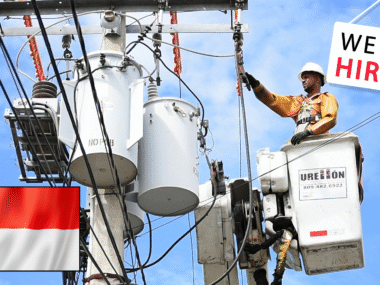Learn how foreigners can secure construction jobs in Singapore with visa sponsorship, including requirements and application tips.
Introduction
Singapore’s construction industry is a cornerstone of its economic growth, driven by ambitious infrastructure projects, urban development, and a global reputation for innovation. For foreigners seeking employment in this sector, opportunities exist, particularly for skilled and semi-skilled workers, but securing a job with visa sponsorship requires understanding the industry, visa requirements, and application processes.
This guide provides a comprehensive overview of how to obtain construction jobs in Singapore as a foreigner, with a focus on visa sponsorship, job requirements, and practical steps to enhance your chances of success.
Understanding Singapore’s Construction Industry
Singapore’s construction sector is thriving, fueled by government-led initiatives like the Housing & Development Board (HDB) projects, commercial developments, and major infrastructure undertakings such as the Tuas Mega Port and Changi Airport expansions. The sector employs a significant number of foreign workers due to local labor shortages, particularly in roles requiring technical expertise or manual labor.
Related Post:
- How to Get Construction Jobs in Norway for Foreigners with Visa Sponsorship
- How to Get Construction Jobs in Luxembourg for Foreigners with Visa Sponsorship
- How to Get a Marriage Visa in Singapore for Foreigners
According to the Ministry of Manpower (MOM), the construction industry relies heavily on foreign workers, who make up a substantial portion of the workforce in roles like brick masons, carpenters, welders, and site supervisors.
Foreigners can find opportunities in both skilled and semi-skilled roles, but visa sponsorship is critical for legal employment. Employers in Singapore often sponsor work permits for foreign workers, especially in construction, where demand for specialized skills remains high. However, competition is stiff, and candidates must meet specific criteria to qualify for sponsorship.
Types of Work Visas for Construction Jobs in Singapore
To work legally in Singapore’s construction industry, foreigners must secure a work visa, commonly referred to as a work pass. The most relevant work passes for construction jobs include:
1. Work Permit for Migrant Workers
-
Eligibility: Designed for semi-skilled workers in industries like construction, manufacturing, and marine shipyards.
-
Requirements: No minimum salary requirement, but candidates must have relevant skills or certifications acknowledged by the MOM. Employers must meet sector-specific quotas for foreign workers.
-
Duration: Valid for up to two years, renewable.
-
Key Note: Employers must apply for this permit on behalf of the worker, and it is tied to a specific employer.
2. S Pass
-
Eligibility: For mid-level skilled workers, such as site supervisors or technicians, earning at least S$3,150 (approximately US$2,346) per month.
-
Requirements: A degree, diploma, or technical certificates, plus relevant work experience. Employers must meet foreign worker quotas and pay a monthly levy.
-
Duration: Valid for up to two years, renewable.
-
Key Note: The S Pass is suitable for roles requiring technical expertise, such as mechanical or electrical technicians in construction.
3. Employment Pass (EP)
-
Eligibility: For highly skilled professionals, such as project managers or engineers, earning at least S$5,000 (US$3,760) per month, or S$5,500 for those in financial services.
-
Requirements: A recognized degree, professional qualifications, or significant work experience. Construction engineers or managers with PMP certification are often eligible.
-
Duration: Valid for up to two years, renewable.
-
Key Note: Less common in construction but applicable for senior roles.
4. Overseas Networks & Expertise Pass (ONE Pass)
-
Eligibility: For top-tier talent earning at least S$30,000 (US$22,560) per month or with a job offer at that salary level.
-
Requirements: Exceptional qualifications or achievements in fields like engineering or project management.
-
Duration: Valid for five years, allowing work for multiple employers.
-
Key Note: Rarely used for construction but relevant for high-level professionals overseeing major projects.
Every candidate must have sponsorship from a legally incorporated Singaporean entity, and employers may use an Employer of Record (EOR) to simplify the process for hiring foreign workers.
Key Requirements for Visa Sponsorship in Construction
To secure a construction job with visa sponsorship, foreigners must meet the following criteria:
-
Relevant Skills and Qualifications: Employers prioritize candidates with trade certifications (e.g., welding, masonry, carpentry) or technical qualifications (e.g., diploma in civil engineering). For skilled roles, certifications like CoreTrade or Multi-Skilling Scheme are advantageous.
-
Work Experience: Most roles require at least 2–4 years of relevant experience. For higher-skilled status, such as under the CoreTrade pathway, a minimum of 4 years of construction experience is needed.
-
Language Proficiency: English is the primary business language in Singapore, and proficiency is often required. Knowledge of Mandarin, Malay, or Tamil can be an advantage, especially for site-based roles.
-
Employer Sponsorship: A job offer from a Singapore-based employer willing to sponsor the visa is mandatory. The employer handles the visa application process, including submitting proof of qualifications and paying levies.
-
Compliance with Quotas: The MOM imposes foreign worker quotas, meaning employers must balance local and foreign hires. This affects the availability of sponsored positions.
Steps to Secure a Construction Job with Visa Sponsorship
-
Research the Job Market
-
Understand the demand for specific roles in Singapore’s construction sector. High-demand positions include:
-
Skilled Trades: Welders, electricians, carpenters, and brick masons.
-
Technical Roles: Civil engineers, mechanical engineers, and site supervisors.
-
Management Roles: Project managers with PMP certification or leadership experience.
-
-
Use job portals like JobStreet, JobsDB, and MyCareersFuture to identify openings. Many listings specify whether visa sponsorship is offered.
-
-
Tailor Your Resume and Cover Letter
-
Customize your resume to highlight relevant skills, certifications, and experience. Include a tailored cover letter that connects your qualifications to the job requirements and emphasizes your interest in the specific company. Avoid generic applications, as Singaporean employers often use resume scanners for initial filtering.
-
-
Obtain Relevant Certifications
-
For semi-skilled roles, certifications like CoreTrade or trade certificates (e.g., welding approved by MOM-recognized institutions) are critical. For skilled roles, a degree or diploma in engineering or construction management is advantageous. Ensure qualifications are recognized in Singapore through ENIC-NARIC.
-
-
Network and Seek Referrals
-
Networking is key in Singapore’s competitive job market. Join platforms like LinkedIn to connect with recruiters and industry professionals. Attend job fairs or InterNations events in Singapore to build contacts. Referrals from current employees can significantly boost your application.
-
-
Apply Through Job Portals and Company Websites
-
Use reputable job portals to find openings:
-
JobStreet: Lists visa-sponsored jobs, including construction roles.
-
JobsDB: Offers email alerts for new visa-sponsored positions.
-
MyCareersFuture: A government-backed portal with strict requirements for employers to consider locals first.
-
-
Check company websites of major construction firms like Shimizu Corporation, Gammon Construction, or Qingjian International for direct applications.
-
-
Partner with Recruitment Agencies
-
Agencies like Randstad or HR Exchange specialize in placing foreign workers in construction roles. They can connect you with employers offering visa sponsorship and guide you through the application process.
-
-
Prepare for Interviews
-
Interviews in Singapore often focus on technical skills, cultural fit, and language proficiency. Be ready to discuss your experience, certifications, and how you can add value to the employer. If applying from abroad, expect virtual interviews initially.
-
-
Understand the Visa Application Process
-
Once hired, your employer will apply for the work pass on your behalf. You’ll need to provide:
-
A copy of your passport.
-
Proof of qualifications (translated into English if necessary).
-
Evidence of relevant work experience.
-
-
The MOM typically processes applications within 3–8 weeks. Ensure all documents are accurate to avoid delays.
-
Top Employers Offering Visa Sponsorship in Construction
Several companies in Singapore’s construction sector are known for hiring foreign workers with visa sponsorship:
-
Shimizu Corporation: A Japanese firm involved in major projects like the Jurong Region Line.
-
Gammon Construction: A Hong Kong-based company with a strong presence in Singapore.
-
Qingjian International: Actively recruits for infrastructure and residential projects.
-
Lendlease: An Australian firm working on commercial and public projects.
These companies often sponsor Work Permits or S Passes for skilled and semi-skilled workers.
Tips for Success
-
Learn About Singapore’s Work Culture: Singapore’s construction industry values punctuality, professionalism, and adherence to safety standards. Familiarize yourself with local workplace norms.
-
Stay Updated on Regulations: The MOM frequently updates foreign worker quotas and visa requirements. Check the official MOM website for the latest information.
-
Consider Short-Term Roles: If long-term sponsorship is challenging, explore short-term training visas or Work Holiday Passes (for those aged 18–25 from eligible countries).
-
Be Flexible: Be open to roles in related sectors like manufacturing or marine shipyards, which also offer visa sponsorship.
-
Improve Language Skills: Proficiency in English is essential, and learning basic Mandarin can set you apart in construction site roles.
Challenges and Considerations
-
High Cost of Living: Singapore is one of the world’s most expensive cities. Ensure your salary covers living expenses, as construction wages for semi-skilled workers can be modest.
-
Competitive Job Market: Singapore prioritizes local hires, so foreigners must demonstrate unique skills or experience.
-
Quota Restrictions: Employers face limits on foreign hires, which may reduce available sponsored positions.
-
Health Insurance: Employers must provide healthcare for Work Permit and S Pass holders, but securing personal health insurance is recommended for additional coverage.
Conclusion
Securing a construction job in Singapore as a foreigner with visa sponsorship is achievable with the right preparation. By understanding visa requirements, obtaining relevant certifications, and leveraging job portals and networks, you can position yourself as a strong candidate. Focus on high-demand roles, tailor your applications, and stay informed about Singapore’s labor regulations. With persistence and strategic planning, you can build a rewarding career in Singapore’s dynamic construction industry.






